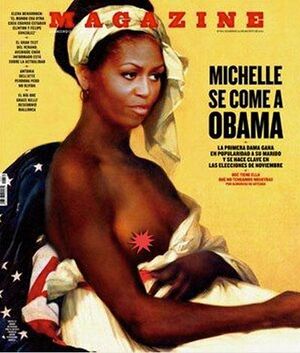UnNews:Michelle Obama's topless portrait not "artsy fartsy"
| Straight talk, from straight faces | ✪ | UnNews | ✪ | Thursday, January 1, 2026, 12:43:59 (UTC) |
| Michelle Obama's topless portrait not "artsy fartsy" | 
|
7 June 2013
MADRID, SPAIN – According to Jessica Wakeman, whoever the hell she is, a portrait of Michelle Obama topless is not art; in fact, it is not even “artsy fartsy.” The portrait appeared on the cover of the Spanish magazine Clutch, which often shows female celebrities “clutching” their own bosoms. “It just shows that Spaniards know nothing of art,” Wakeman charged, despite historians' praise for such Spanish artists as Pablo Picaso, Francisco de Goya, and Salvador Dali, to name only a few.
The portrait, its artist, Karina Percheron-Daniels, says, “Is in good taste and is both politically and historically, accurate,” depicting the First Lady as the “granddaughter of a slave.”
In the portrait, Michelle is shown as seated in a chair, the back of which is draped by the American flag. She wears a turban wrapped around her carefully coiffed, up-swept hair, and seems both "uppity" and angry at the world, which “is faithful,” the artist says, “to her everyday demeanor.” In addition, the First Lady is topless, her right breast on display, with only the nipple covered with a star-shaped pastie that the editors airbrushed in, to hide Michelle's “offensive teat,” the artist claims.
Percheron-Daniels says she painted the First Lady in this manner because she wanted to show that “black can be beautiful, too.” Many nudes, including the one of the late actress Bea Arthur, show famous women naked, but they tend to be white women, who are considered to be naturally more beautiful than women of color. “I wanted to depict a famous black woman as attractive, personally and sexually,” the artist said. However, she admited that Michelle may not have been a good choice. "I should have painted Halle Berry, but, then, everyone's already seen her boobs."
Indeed, few regard the First Lady's portrait as in any way beautiful, and some claim that it is “offensive,” “shocking,” “degrading,” “ugly,” or even “racist.”
She has a dishtowel on her head, Attorney General Eric Holder pointed out, when his bid for the painting was rejected, “and she has one tit out, as if she's a slave whose purpose in life is to suckle white babies.” He wanted the portrait, he said, to add to his “private collection,” which includes nudes of Queen Elizabeth and his “boss,” Michelle's better half, President Barak Obama.
Holder admits to fantasizing about the First Lady. “In my fantasies,” he said, “I am the master, and she is the slave.” Having her bare-breasted likeness, he said, would have assisted “me in devising new imaginary scenarios for my mistreatment and abuse of her.” One of his fantasies, he said, “involves whips and chains,” and another includes his “boss” in a menage a trois “that is not to be believed.”
Unfortunately, the original painting was sold to another art patron with a bigger bank account, if not a more fertile imagination. Christie's Auction House, which sold the painting, would not identify the buyer, although it is rumored that Jimmy Kimmel, who purchased the topless Arthur portrait, may also now own the First Lady.
Historically, famous women have been subjects of nude portraits, including Marilyn Monroe, Betty Grabel, Jane Russell, Ava Gardner, and Marlene Dietrich.
Although the First Lady's topless portrait has been called “offensive,” nude paintings of other celebrities, such as Sarah Palin (painted by Bruce Elliot); Keira Knightley (painted by Mitch Griffiths); Naomi Watts, Kylie Minogue, and Megan Gale (painted by David Bromley); and Selma Hayek (painted by Margaret Rose Perenchio), have been called “exquisitely beautiful.” “Of course,” Percheron-Daniels points out, “all these women, with the possible exception of Hayek, are white, and white is beautiful.”
Sources[edit]
- Jessica Wakeman "No, Michelle Obama Topless On A Magazine Cover Is Not “Artsy”". The Frisky, August 27, 2012
- Duh! "Why Celebrities Pose Nude for Paintings". Hub pages, Sometime in 2013
